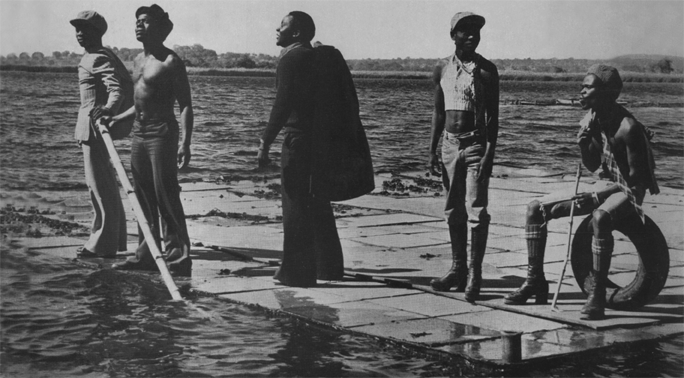Global Beat: WITCH

Back in 1973, the landlocked southern African nation of Zambia was on the verge of a meltdown. During an uneasy decade of independence from British colonial rule, president Kenneth Kaunda had enforced a one-party political system and begun nationalizing the country’s copper mining industry. When the price of oil skyrocketed and copper plummeted in the aftermath of a worldwide energy crisis, the Zambian economy was brought to its knees, while the country’s neighbors – Angola, Mozambique and Rhodesia (Zimbabwe) – boiled over with their own bloody struggles for self-rule.
For Emmanuel Kangwa “Jagari” Chanda and his friends, the solution to their woes was easy: rock and roll. “You see, we were already hearing imported culture from Europe, England and America,” Chanda says today, speaking from his home in the Zambian capital of Lusaka. “We were somewhat limited as to where we sourced our music – it was either stations like Radio Mozambique or magazines like Melody Maker – but records were available and cheap. We were into The Beatles, Rolling Stones, Jimi Hendrix, Deep Purple – even bands like The Equals from England, who visited Zambia, and a West African fusion band called the Osibisa. They all influenced us.”
Chanda knew that he wanted to channel that energy into his own music, so he started jamming with local bands like The Black Souls, honing his chops as a singer and songwriter. Eventually, he was recruited into the Kingston Market Band, which morphed into a six-piece outfit called Witch (We Intend To Cause Havoc). The group’s earliest albums, Introduction (1973) and In the Past (1974), throbbed with the raw, proto-psychedelic garage sound of bands like Them, Love and The Zombies. By the middle of the ‘70s, as their sound evolved toward an amalgam of rock and homegrown ethnic rhythms, Witch had become one of the biggest draws in Zambia – maybe not a huge feat in a nation of six million, but the story doesn’t end there.
Fast forward some 30 years, when Now-Again label founder and curator Eothen “Egon” Alapatt came across some early Witch material through his work with Zambian rock pioneer Rikki Ililonga. He was especially floored by the group’s third album Lazy Bones!! which he reissued in 2010 to a near-universal chorus of bemused – and amazed – head-scratching. How the hell did a ‘70s rock band from Zambia end up sounding so fiercely psychedelic and funky?
“I would say it was a progressive leap,” Chanda says, equally bemused. "We were experimenting and we had access to more records through Teal Record Company [in South Africa], which had signed us to a contract. They were sending us free copies of all the foreign pop and rock music, so we had some more influences to work with, and we applied them to getting new guitar pedals like the fuzz and wah-wah. Our lead guitarist [Chris “Kims” Mbewe] stopped being too natural with the guitar, and started using effects. [Laughs.] Listening to Grand Funk Railroad was a big part of that, too. We even played ‘Rain Keeps Fallin’’ at our shows."
The GFR sound is just one of many that seeps through on WITCH: We Intend To Cause Havoc (Now-Again), a lovingly assembled 4-CD box set that collects all of the key albums and 7-inch singles that the band recorded between 1972 and 1977. As a prime slab of vintage “Zamrock,” the collection is indispensable.
“Over the years, I think we were finding our own ethnic rock music,” Chanda clarifies. “If you listen to ‘Janet,’ which was a hit for us in ‘77, it has a very unique beat. It’s not rumba and it’s not kwela from South Africa. It’s Zambian ethnic rock music. We have about 72 tribes in this country, and each tribe has its own music unique to itself. That gave us an opportunity to explore this big repertoire of music in the country, and ‘Janet’ was one of the first.”
As their musical direction changed further, the members of Witch began to drift apart. Despondent over the emerging popularity of disco, Chanda quit in 1980, and although he managed to stay involved in music, he never regained the spotlight he had with Witch. Today, he’s the last surviving member of a band that has inspired everyone from actor Elijah Wood to the producers at the Adult Swim network, which uses Witch clips in its 15-second bump ads.
“It’s very nice to be recognized after so many years,” Chanda admits. “It also brings back memories, because I wish my friends were alive so they could be part of what’s going on right now. They all died of sickness and disease [possibly due to HIV/AIDS, which devastated Zambia in the ‘90s]. But it’s a nice feeling that people still play our music today. It’s like a rebirth, because you have another opportunity to prove yourself.”




















